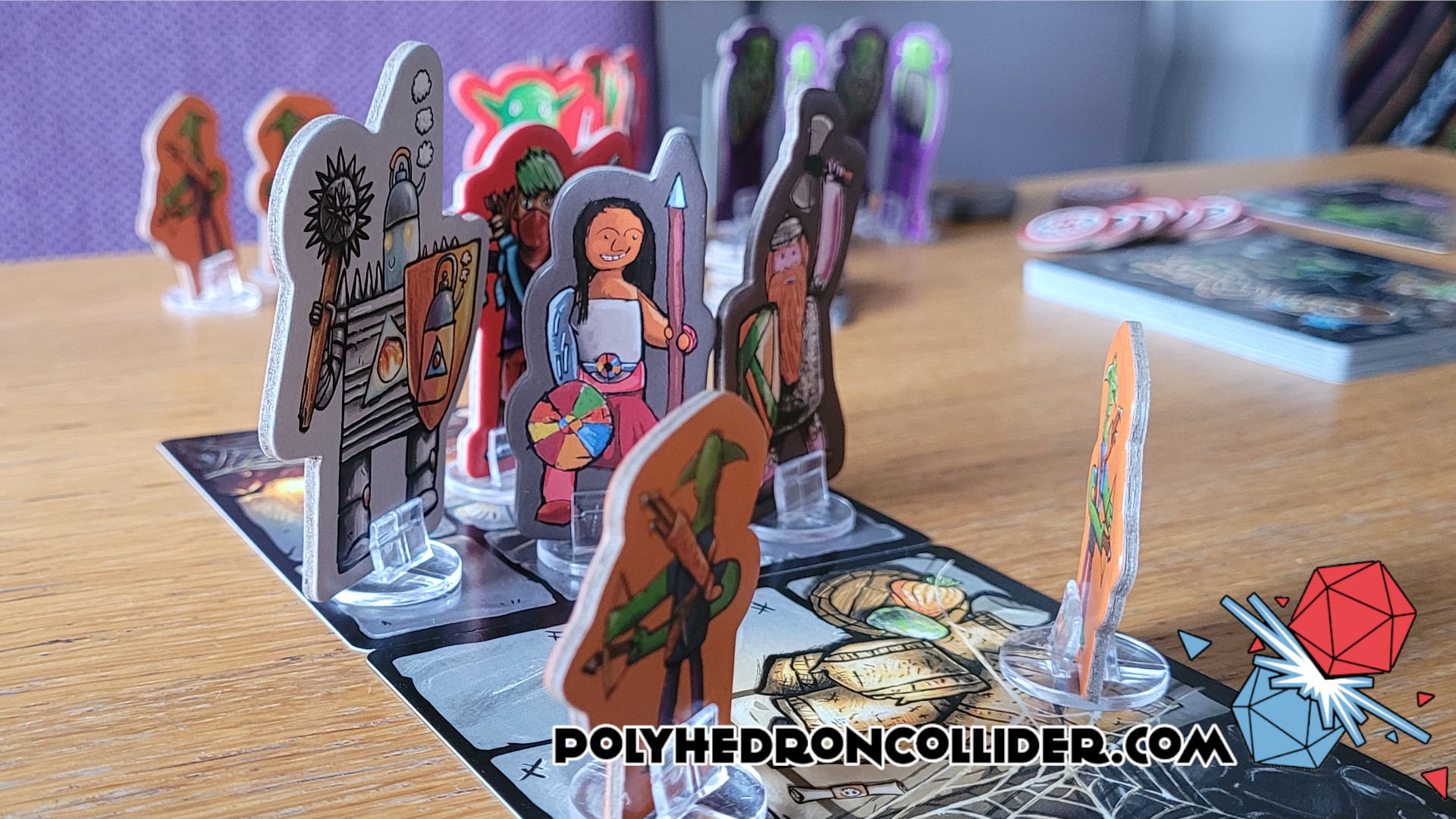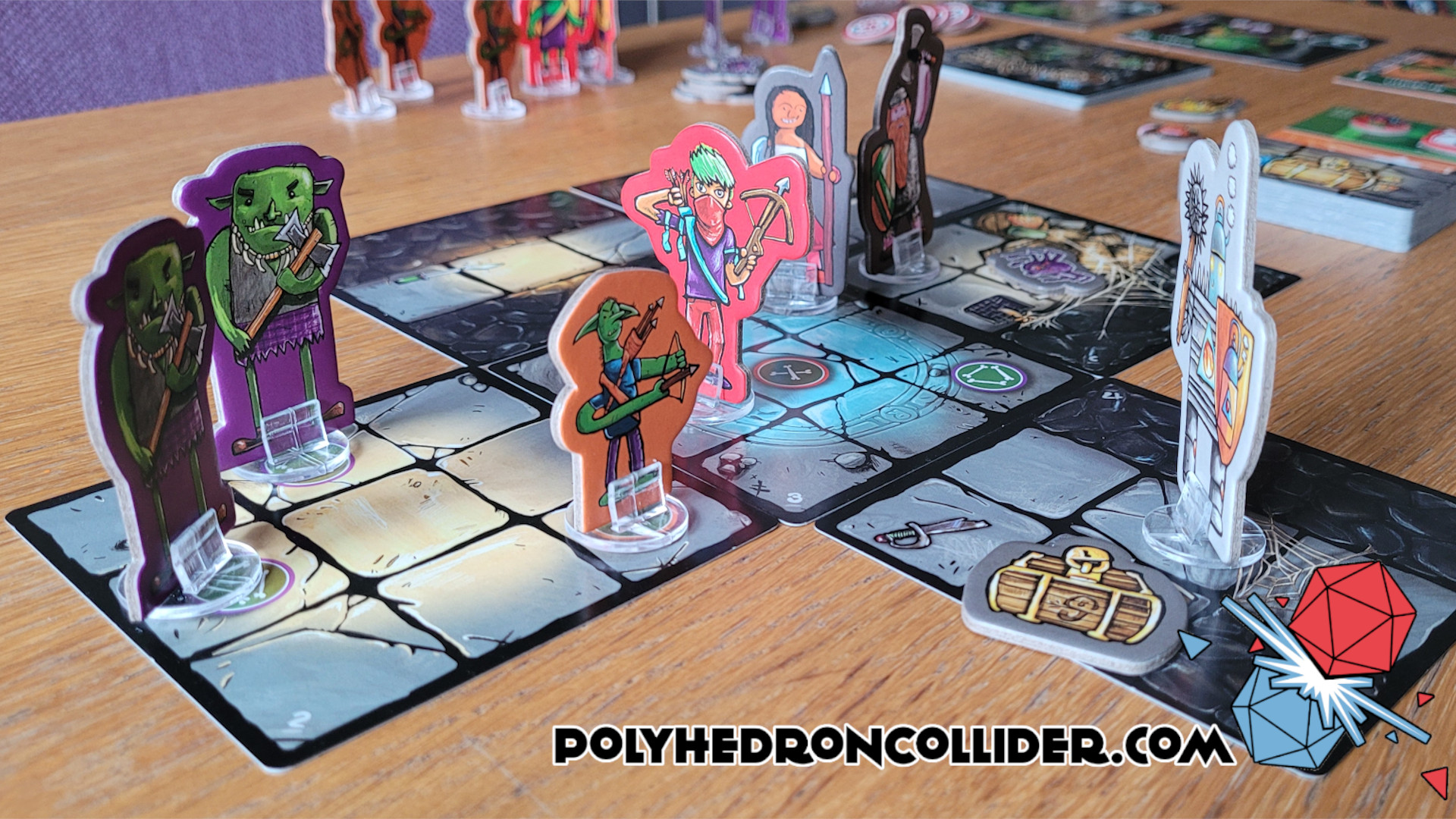Not to be grandiose in the introduction to this review, but, can we start by agreeing that the point of board gaming is to have a fun and engaging interaction with others? Good. Now, as a parent*, if I can do this with my kids, well that is fantastic. That is to say, I too can have fun. And not ‘vicarious fun’ through my children’s enjoyment, but to have an actual fun and engaging interaction with them. Well, if you are a parent reading this, I think we can agree that is priceless.
Yes, there are a bunch of games out there that kids all over the world love: Hungry Hippos, Guess Who, Operation…blah, blah, bloody blah. But, you and I, dear reader, we are cut from a different cloth. We are gamers and we demand more from our games for our offspring.
Well. Demanded. Past tense. Because now we have CoraQuest.
This is a classic dungeon crawler. This game pitches a band of heroes against a Dungeon Master (that’s probably going to be you), as they explore and fight their way through a randomly generated dungeon to face down the boss in a hopefully epic pitched battle. The heroes will need to work together, they’ll need to consider their strengths and weaknesses, they will need to communicate, empathise, plan, judge risks, and do some basic maths. The hardest thing they’ll have to do is try not to fling the dice across the room in their excitement.
CoraQuest boils down all of the mechanics and dice rolling and keeps it nice and simple - that doesn’t mean that it isn’t interesting or boring, it’s just that; simple. Or better yet: slick. By doing this it keeps engagement high and propels players through the dungeon.
The beauty of this is that it comes down to the dice. We have red dice and white dice, each of which displays hits. On the red dice, there is a 50% chance of success, and on the white dice, just 33%. That is it for all combat. There’s no strength, no toughness, no armour values, combat bonuses, skills, perks, or magic. Just red and white dice. This simple and slick design choice allows the game to play incredibly smoothly. Red dice are better than white dice. More dice are better than fewer dice.
Younger players therefore can very quickly assess which is the toughest monster in the room, that the warhammer they just pulled from the treasure chest (2 white dice) is better than the morningstar they’ve been carrying around. Do they understand the 17% increase in a hit probability, no, but they understand enough to know that it is fun.
CoraQuest controls the pace of the game cleverly and efficiently too - and between you and me, this is something those “adult-dungeon-crawlers” could learn from. The dungeon is made up of a deck of room cards. At the start of the game this deck is quartered and within each section, a special, narrative room card is added (this makes all the dungeons a little bit different). Players are encouraged to continually explore the dungeon, they get very little opportunity to slow down and consolidate as on top of this deck is placed the exploration torch: every time you explore, the torch is removed and a new dungeon tile is added. Fail to explore and the Danger token advances and when this advances beyond the Countdown Tracker card spiders crawl from their hiding places and attack.
These spiders aren’t difficult to kill, and they are not particularly dangerous (attacks with 1 white die) but they are a nuisance. Especially if you are facing down some orcs and goblins. This threat is always lurking and it compels play and the story to always move forward.
This game was co-designed by eight-year-old Cora and her Dad. The art was provided by children from across the globe during the Kickstarter. The names of the characters are a little silly (if not tongue and cheek. Reading “Wizard Pebbledash” aloud always brings a little smirk to my face) but by no means is this a simple “kids” game. My son always wants to play as the dungeon master and he often beats me, a forty-something gamer who writes reviews and has a boardgame podcast. And I don’t go easy on him. Far from it in fact, he will intentionally go easy on me, dishing damage out to players he knows can take it because he knows that defeating me will end the game, and he never wants this game to end.
A quick, final note on the age appropriateness of this game. Some reading this may wonder if the game is appropriate enough or engaging enough for younger players. My children, who love this game were four and six when we first got the game; my four-year-old didn't have the same level of engagement as her big brother, but both now love it. I’ve introduced this game to children of eleven and twelve and they too have found it fun, and engaging, but still challenging. There is imagined violence in this game, the killing of goblins, spiders and trolls but there is nothing overt or extreme on any of the cards or rulebook.
Ultimately, CoraQuest does absolutely everything you need a dungeon crawler to do. It just happens to pitch the art and the narrative to younger gamers.
*I’m assuming you are a parent reading this, but you might equally be an aunt, uncle, grandparent, family friend etc. etc. so please just mentally swap out parental and offspring references to terms more fitting for your perspective. I am a Dad, and an uncle and friend to some with children, either way, I hope my passion and endorsement of this game come through, regardless of the relationship.





Comments
Post a Comment